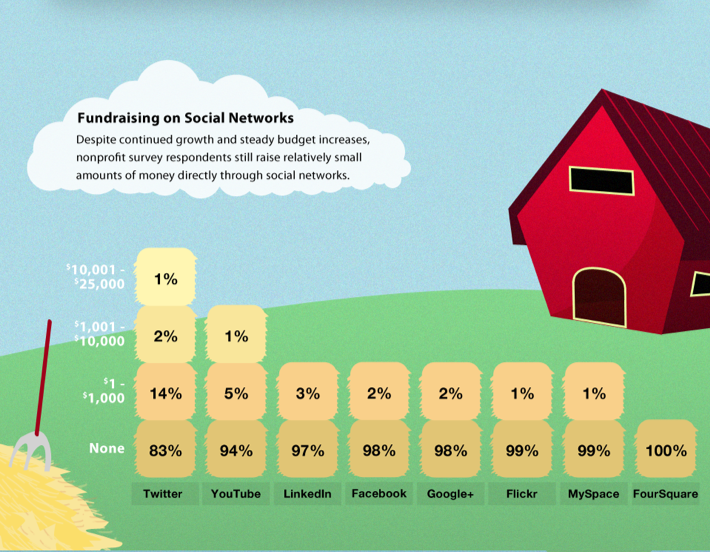 As you have probably experienced yourself, raising money for your nonprofit campaign on social media is like pulling teeth. According to the 2012 Nonprofit benchmark Social Network Benchmarking Report, 98% of nonprofits didn’t raise a dime on Facebook, which is the second most trafficked site on the web in the U.S. About 2% of nonprofits raised between $1 and $1,000. Nonprofits appear to have had slightly more success raising money on Twitter with an estimated 14% of nonprofits raising between $1 and $1,000. These numbers are dismal and nonprofits should not expect these figures to change drastically heading into 2013. As nonprofits gear up for their campaigns in the coming year, don’t look to social media as a fundraising funnel. Instead focus on social networks as they were always intended – communities to build relationships with people and engage in discussion around the core issues you are working on.
As you have probably experienced yourself, raising money for your nonprofit campaign on social media is like pulling teeth. According to the 2012 Nonprofit benchmark Social Network Benchmarking Report, 98% of nonprofits didn’t raise a dime on Facebook, which is the second most trafficked site on the web in the U.S. About 2% of nonprofits raised between $1 and $1,000. Nonprofits appear to have had slightly more success raising money on Twitter with an estimated 14% of nonprofits raising between $1 and $1,000. These numbers are dismal and nonprofits should not expect these figures to change drastically heading into 2013. As nonprofits gear up for their campaigns in the coming year, don’t look to social media as a fundraising funnel. Instead focus on social networks as they were always intended – communities to build relationships with people and engage in discussion around the core issues you are working on.
In the book Social Change Anytime Everywhere that I co-wrote with Amy Sample Ward (being published by Wiley and coming out in February 2013), we discuss how social media won’t bring in buckets of money in the short term, yet it’s one of several touch points that should be used in your communications plans to connect with constituents who you can cultivate over time. It can also be used to introduce new people to your organization or campaign and get them excited enough to join your movement and share it with their friends, family, and colleagues. If you build a strong relationship with constituents on social media (or any channel) and move them up the engagement ladder, you can convert a percentage of them to donors during the course of your relationship with them. That is the value of social networks. It takes a lot of work and time to nurture those relationships and convert them to donors so be prepared to make that investment if you want to see results in the long term.
Social media can also help your organization build a more personal relationship with your current base of donors and activists, which is important to maintaining a good relationship with them. All too often, nonprofits fall into the trap of the “give me, give me, give me” mentality, which is the fastest way to burn out your donors. Fundraising consultant, Nick Allen, sums it up perfectly. “People did not sign up for your list, take your advocacy action, or donate because they wanted to get more fundraising appeals in their inboxes. They engaged with you because they cared about your organization, or mission, or effort -- so you need to continue engaging them and take them along an engagement path.”
If you are going to embark on fundraising via social media here are some tips I have learned through launching and test social fundraising campaigns.
Make it Timely and with a Sense of Urgency
When Craig Newmark founder of craigslist and craigconnects wanted to raise awareness and money to support Hurricane Sandy relief efforts, we helped him launch a social fundraising campaign on Crowdrise. Craig heard the news reports say that the storm was expected to cause serious damage across the East Coast. He knew that organizations like AmeriCares, who were going to be first responders in the immediate aftermath of the storm were going to need financial assistance ASAP to distribute food, water, and supplies to people in Sandy affected areas. Through multichannel campaign efforts (including social media), Craig and others rallied people to donate money and they turned $25K into $50K in 48 hours.
Have a Big and Active Email List
Ever since social media gained enormous popularity among marketers, several of them have talked about how email is dying. That’s bogus. Email is alive and well and without it, social fundraising campaigns would be a total failure. We ran some tests including having celebrities’ tweet and share social fundraising campaigns. We learned that Twitter or Facebook on its own can get many retweets and shares (particularly when a celebrity tweets it or shares it on FB) but we found very few people actually donated money. However, after blasting out an email appeal to sizable and active email lists, people started donating money. The majority of the donations came from email blasts not social media asks, though social media was definitely helpful in getting people to share the campaign.
Have a Donor Sponsor a Hashtag Campaign
If you have a corporate sponsor or notable philanthropist who wants to support your organization more publicly, developing a fundraising campaign using a clever hashtag on social media can be a win win for both of you. For example, for Craig’s 59th birthday last December, he asked people on Facebook, Twitter, on his blog, etc. to tell him what their #perfectgift would be, for themselves or someone else. For each hashtag mention across the web, he would donate $1 up to $10K to the American Red Cross. The money was used to support the purchase of military comfort kits for the U.S. troops. Craig visited the Red Cross during the campaign, met with the staff and did a great video with Gail McGovern, President and CEO of the American Red Cross about the #perfectgift campaign and the purpose of the comfort kits for the Veterans. The campaign was very successful and engaged thousands of people on social media who discussed their ideas for the #perfectgift such as:
“@annekbradley said, "This year , I donated to Aid to Victims of Domestic Violence, my dad's favoriote charity, in his honor. #perfectgift"
@benmangan "donated to #PolarisProject, which fights modern day slavery, in memory of [his] grandmother, Florence Mangan."
People shared photos of their #perfectgift, as well. @LaurenJJohnson shared a picture of her giving blood: "the gift that saves the day through @RedCross!"
Have you tested social fundraising campaigns at your nonprofit? What were the results?




COMMENTS